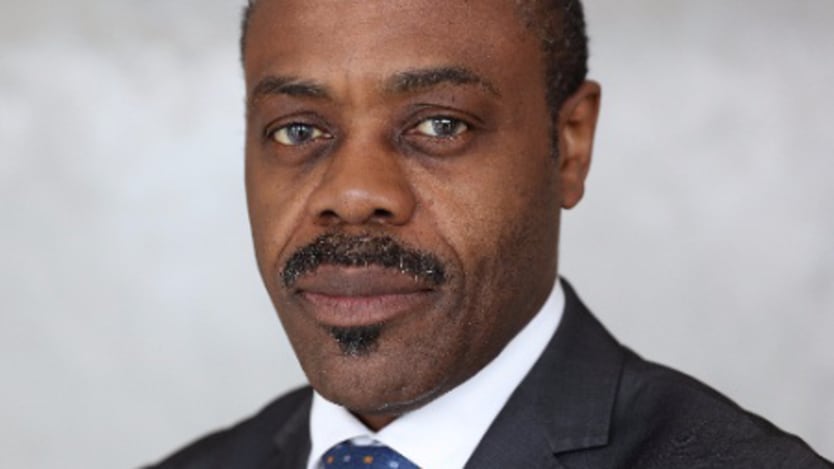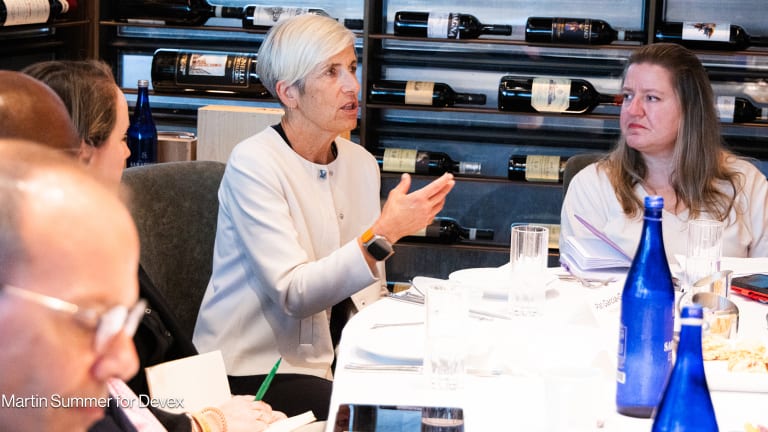
DAVOS, Switzerland — The Democratic Republic of the Congo has a long way to go to providing universal health care, with limited access to basic services and poor health care outcomes, and the country’s Minister of Health Dr. Oly Ilunga Kalenga is quick to acknowledge it.
Burdened by economic and demographic problems — the country has a population of 78 million people, which is set to double by 2050 — there is growing strain on a weak system, he told Devex in an interview on Wednesday. The country has about $1 billion a year for health care spending, and what it needs is $20-30 billion a year, he said.
“Even a very well-functioning state would have difficulties catching up with a growth rate like this one,” Kalenga said. “For us, [the] only way [to] catch up with growth is to work with the private sector.”
The solution for more money is not external donors; the important thing is to use resources more efficiently and work to expand the economy to generate more funding for health care, he said. It will also take more coordination across all the actors in the health care system — from donors, to private companies, and even patients, Kalenga said.
One of the key problems is significant fragmentation of all donors in the DRC, which leads to redundancy and inefficiency, he said. But the government, with the support of the Global Financing Facility, has created a strategic platform with six of its major donors to better align with government priorities and work together to deliver health care.
“One thing is very important when you think about the health care sector: [You] have to see in a country one health sector, not one public and one private, but one with many actors,” Kalenga said, adding that each country has to find appropriate way to work with all actors.
To better engage the private sector, particularly the local private sector, the ministry of health is working to create a private health actors alliance that would work with the government to increase collaboration, create an enabling environment, reduce investment risks, and work on issues of governance and regulation. While government will create norms and regulations, and will have to move toward a system of accreditation that holds all health care providers to certain quality standards, it will do so with the input of the private sector, he said.
But underpinning success in building a better health system and ensuring access, is the need for a paradigm shift, Kalenga said. All actors need to be more oriented on results, effectiveness, and an evidence base, and that mental shift is the biggest challenge he faces in trying to build the health system, he said.
People have historically been more input-oriented, a classic public health approach, Kalenga said, but through the GFF, the country developed the investment case of maternal and child health, which was an exercise in setting priorities based on the most cost effective interventions, which can be applicable throughout health care. This more results-oriented model is needed throughout the country, including in regions where there are large populations of internally displaced people, he said, including the Kasai region, which has the most recently displaced people.
In humanitarian situations the government will work with humanitarian agencies and organizations. But he said even in emergency situations, the work should be strategic and targeted and focused on building a sustainable and resilient system that will help after a crisis or in future crises, he said.
“For me ... the big issue is alignment, alignment, alignment,” he said. “Many NGOs and donors are used to working with a humanitarian mentality but not anymore. We have to move in a sustainable development approach. That is my biggest advocacy.”
In Kasai, the ministry organized a forum on emergencies to discuss issues with all the actors and it issued a roadmap to try to improve alignment and map resources and to target support in a coordinated manner.
The cholera outbreak in the region is now under control, with the number of cases a week dropping from 1,000 in October to about 100 a week today, Kalenga said, although the government was anxious given the state of the health care system in the region. The government mobilized a monitoring center and sent expert teams to areas where there were elevated rates of cholera to help communities understand how cholera is spread. Those efforts helped keep the outbreak low, he said.
Read more Devex coverage on the Democratic Republic of Congo.








